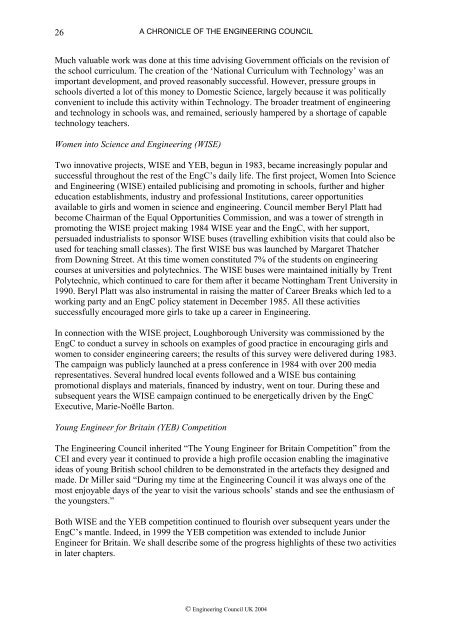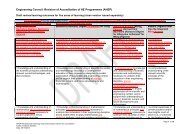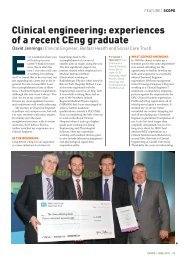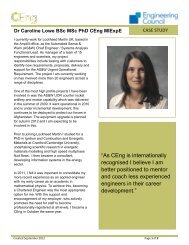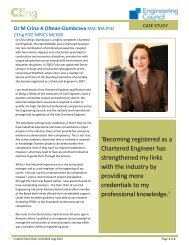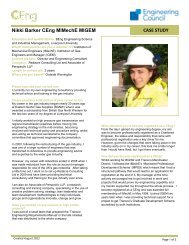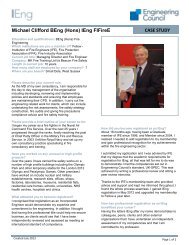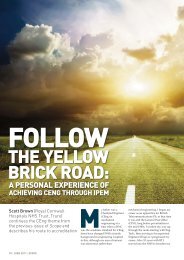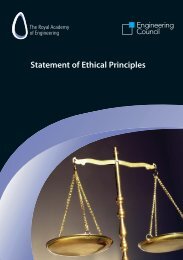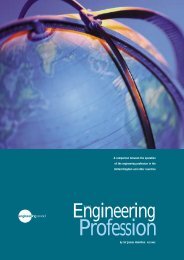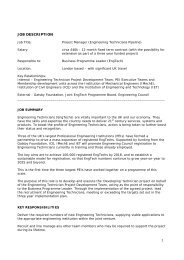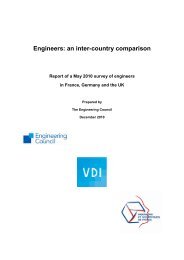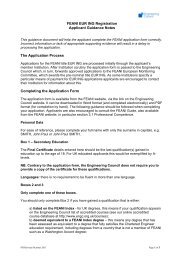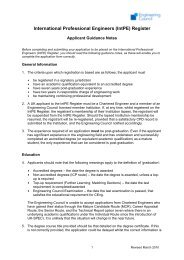An Engine for Change - A Chronicle of the Engineering Council
An Engine for Change - A Chronicle of the Engineering Council
An Engine for Change - A Chronicle of the Engineering Council
Create successful ePaper yourself
Turn your PDF publications into a flip-book with our unique Google optimized e-Paper software.
26A CHRONICLE OF THE ENGINEERING COUNCILMuch valuable work was done at this time advising Government <strong>of</strong>ficials on <strong>the</strong> revision <strong>of</strong><strong>the</strong> school curriculum. The creation <strong>of</strong> <strong>the</strong> ‘National Curriculum with Technology’ was animportant development, and proved reasonably successful. However, pressure groups inschools diverted a lot <strong>of</strong> this money to Domestic Science, largely because it was politicallyconvenient to include this activity within Technology. The broader treatment <strong>of</strong> engineeringand technology in schools was, and remained, seriously hampered by a shortage <strong>of</strong> capabletechnology teachers.Women into Science and <strong>Engine</strong>ering (WISE)Two innovative projects, WISE and YEB, begun in 1983, became increasingly popular andsuccessful throughout <strong>the</strong> rest <strong>of</strong> <strong>the</strong> EngC’s daily life. The first project, Women Into Scienceand <strong>Engine</strong>ering (WISE) entailed publicising and promoting in schools, fur<strong>the</strong>r and highereducation establishments, industry and pr<strong>of</strong>essional Institutions, career opportunitiesavailable to girls and women in science and engineering. <strong>Council</strong> member Beryl Platt hadbecome Chairman <strong>of</strong> <strong>the</strong> Equal Opportunities Commission, and was a tower <strong>of</strong> strength inpromoting <strong>the</strong> WISE project making 1984 WISE year and <strong>the</strong> EngC, with her support,persuaded industrialists to sponsor WISE buses (travelling exhibition visits that could also beused <strong>for</strong> teaching small classes). The first WISE bus was launched by Margaret Thatcherfrom Downing Street. At this time women constituted 7% <strong>of</strong> <strong>the</strong> students on engineeringcourses at universities and polytechnics. The WISE buses were maintained initially by TrentPolytechnic, which continued to care <strong>for</strong> <strong>the</strong>m after it became Nottingham Trent University in1990. Beryl Platt was also instrumental in raising <strong>the</strong> matter <strong>of</strong> Career Breaks which led to aworking party and an EngC policy statement in December 1985. All <strong>the</strong>se activitiessuccessfully encouraged more girls to take up a career in <strong>Engine</strong>ering.In connection with <strong>the</strong> WISE project, Loughborough University was commissioned by <strong>the</strong>EngC to conduct a survey in schools on examples <strong>of</strong> good practice in encouraging girls andwomen to consider engineering careers; <strong>the</strong> results <strong>of</strong> this survey were delivered during 1983.The campaign was publicly launched at a press conference in 1984 with over 200 mediarepresentatives. Several hundred local events followed and a WISE bus containingpromotional displays and materials, financed by industry, went on tour. During <strong>the</strong>se andsubsequent years <strong>the</strong> WISE campaign continued to be energetically driven by <strong>the</strong> EngCExecutive, Marie-Noëlle Barton.Young <strong>Engine</strong>er <strong>for</strong> Britain (YEB) CompetitionThe <strong>Engine</strong>ering <strong>Council</strong> inherited “The Young <strong>Engine</strong>er <strong>for</strong> Britain Competition” from <strong>the</strong>CEI and every year it continued to provide a high pr<strong>of</strong>ile occasion enabling <strong>the</strong> imaginativeideas <strong>of</strong> young British school children to be demonstrated in <strong>the</strong> artefacts <strong>the</strong>y designed andmade. Dr Miller said “During my time at <strong>the</strong> <strong>Engine</strong>ering <strong>Council</strong> it was always one <strong>of</strong> <strong>the</strong>most enjoyable days <strong>of</strong> <strong>the</strong> year to visit <strong>the</strong> various schools’ stands and see <strong>the</strong> enthusiasm <strong>of</strong><strong>the</strong> youngsters.”Both WISE and <strong>the</strong> YEB competition continued to flourish over subsequent years under <strong>the</strong>EngC’s mantle. Indeed, in 1999 <strong>the</strong> YEB competition was extended to include Junior<strong>Engine</strong>er <strong>for</strong> Britain. We shall describe some <strong>of</strong> <strong>the</strong> progress highlights <strong>of</strong> <strong>the</strong>se two activitiesin later chapters.© <strong>Engine</strong>ering <strong>Council</strong> UK 2004


